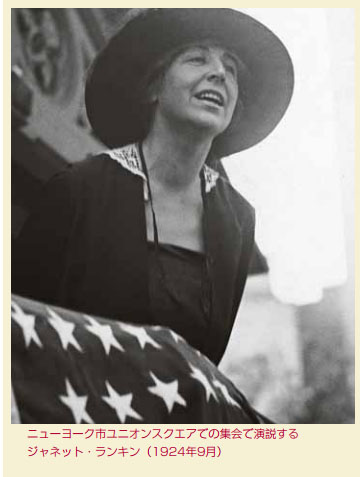国務省出版物
女性実力者の系譜-政府における女性の役割 「ジャネット・ピカリング・ランキン」
 女性初の合衆国連邦議会議員 1880年6月11日生まれ、1973年5月18日死去
女性初の合衆国連邦議会議員 1880年6月11日生まれ、1973年5月18日死去
ジャネット・ランキンは、1917年4月2日に連邦議会下院で議席を獲得した。両院を通じて選出された初の女性議員だった。全米の女性が投票権を獲得する3年前だった。モンタナ州で生まれたランキンは、政治に強い関心を持つ、エネルギッシュな若い女性で、それまでの生涯を女権拡張と平和の大義に捧げた。彼女は、ニューヨーク慈善学校(後のコロンビア大学社会福祉事業大学院)で学位を取得し、ワシントン州シアトルでソーシャルワーカーになった。自分が担当する福祉受給者の実情を知るために、彼女はしばらくの間、お針子として働いた。ランキンは1910年にワシントンで起きた参政権運動に参加して、1914年にはモンタナ州で女性参政権運動を指揮して成功を収めた。
モンタナ州で新たに選挙権を得た女性たちの支援を受け、ランキンは、1916年に共和党から連邦議会に選出された数少ない議員の1人となった。
米国女性のために発言するのが自分の「特別な使命」だと感じたランキンは、女性と子どもを助ける法律の草案作成に貢献し、女性に投票権を与える憲法改正を支援した。しかし彼女は、1920年にすべての米国人女性に選挙権が与えられるまで、連邦議会にとどまることができなかった。彼女は1918年に上院議員に立候補したが、有権者はこれを拒否した。おそらく、その1年前に、米国の第1次世界大戦参戦に反対票を投じたのが原因だった。
ランキンは社会事業と、全米消費者連盟、婦人国際平和自由連盟などの組織の改革に戻った。そして、1919年にチューリッヒで開催された第2回国際女性会議に参加した。1940年に連邦議会に再選されたランキンは、真珠湾攻撃の後、連邦議会でただ1人、対日戦への反対票を投じた。この不人気な1票で政治生命を終えたランキンは、余生を自分の好きな活動に奉げた。例えば、86歳のときには、ベトナム戦争に反対するワシントンの大行進に参加した。
ジャネット・ランキンは、女性の才能と知識を、よりよい社会の建設に生かすことの重要性を理解していた。「男と女は右手と左手のようなものだ。両方を使わないのは意味がない」と彼女は述べた。彼女は遺言の中で、女性が教育を受けて社会の向上に貢献できるようにするための資金を残した。この意志の固い、献身的な米国人が残した多くの遺産の1つであるジャネット・ランキン財団は、1976年に設立認可を得て以来、低所得層の女性に教育の機会を提供し続けている。
*上記の日本語文書は参考のための仮翻訳で、正文は英文です。
Jeannette Pickering Rankin
First Woman Member of the U.S. Congress
(Born: June 11, 1880; Died: May 18, 1973)
Jeannette Rankin took her seat in the U.S. House of Representatives – the first woman to be elected to either chamber – on April 2, 1917. It would be another three years before women throughout the United States earned the right to vote.
Rankin, born in Montana, was an energetic young woman with a zest for politics and a life-long devotion to feminist and pacifist causes. With a degree from the New York School of Philanthropy (later Columbia University's School of Social Work), she became a social worker in Seattle, in Washington State. To gain first-hand knowledge of her clients' condition, she worked for a while as a seamstress. Rankin joined the 1910 suffrage drive in Washington and led the successful campaign in 1914 for women's suffrage in Montana. The new women voters in Montana helped Rankin become one of the few Republicans elected to Congress in 1916.
Seeing it as her "special duty" to speak for American women, she helped draft legislation helping women and children and supported a constitutional amendment to give women the right to vote. She did not stay in Congress long enough to see suffrage extended to all American women in 1920, however. Voters rejected her bid to become a senator in 1918, probably because of her vote against U.S. entry into the First World War a year earlier.
Rankin returned to social work and to reform organizations, such as the National Consumers' League, the Women's International League for Peace and Freedom, and – in 1919 – attended the Second International Congress of Women in Zurich. Re-elected to Congress in 1940, she cast the only vote in Congress against war on Japan after the attack on Pearl Harbor. With her political career ended by this unpopular vote, Rankin devoted the rest of her life to her favorite causes. At age 86, for instance, she participated in the March of Washington opposing the Vietnam War.
Jeannette Rankin understood the importance of engaging women's talents and expertise to build better societies. "Men and women are like right and left hands; it doesn't make sense not to use both," she said. In her will, she left money to ensure that women could get an education to help improve society. The Jeannette Rankin Foundation, one of the many legacies of this determined and committed American, has been providing educational opportunity to low-income women since it was chartered in 1976.




